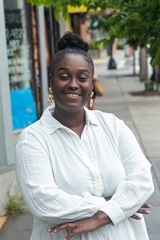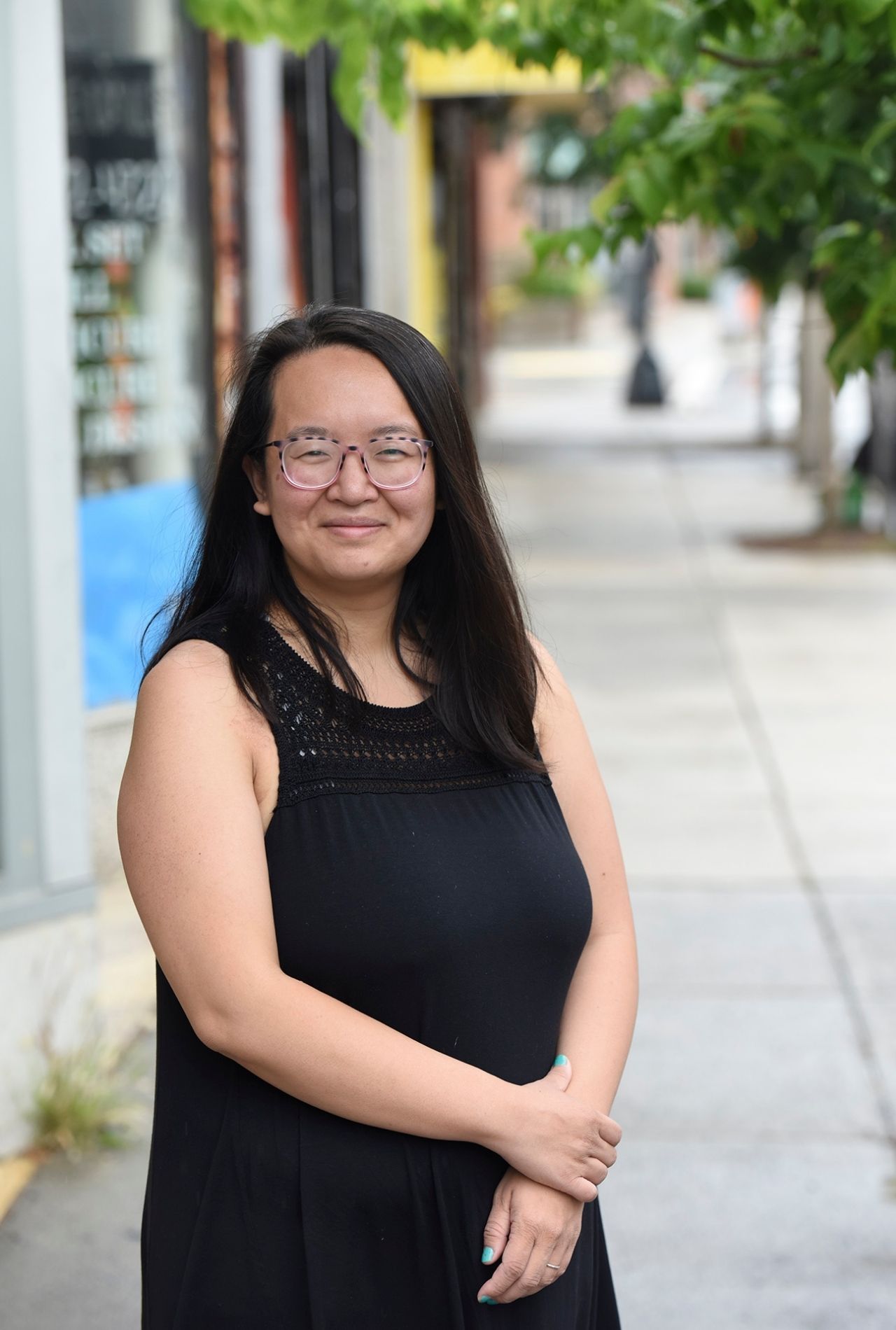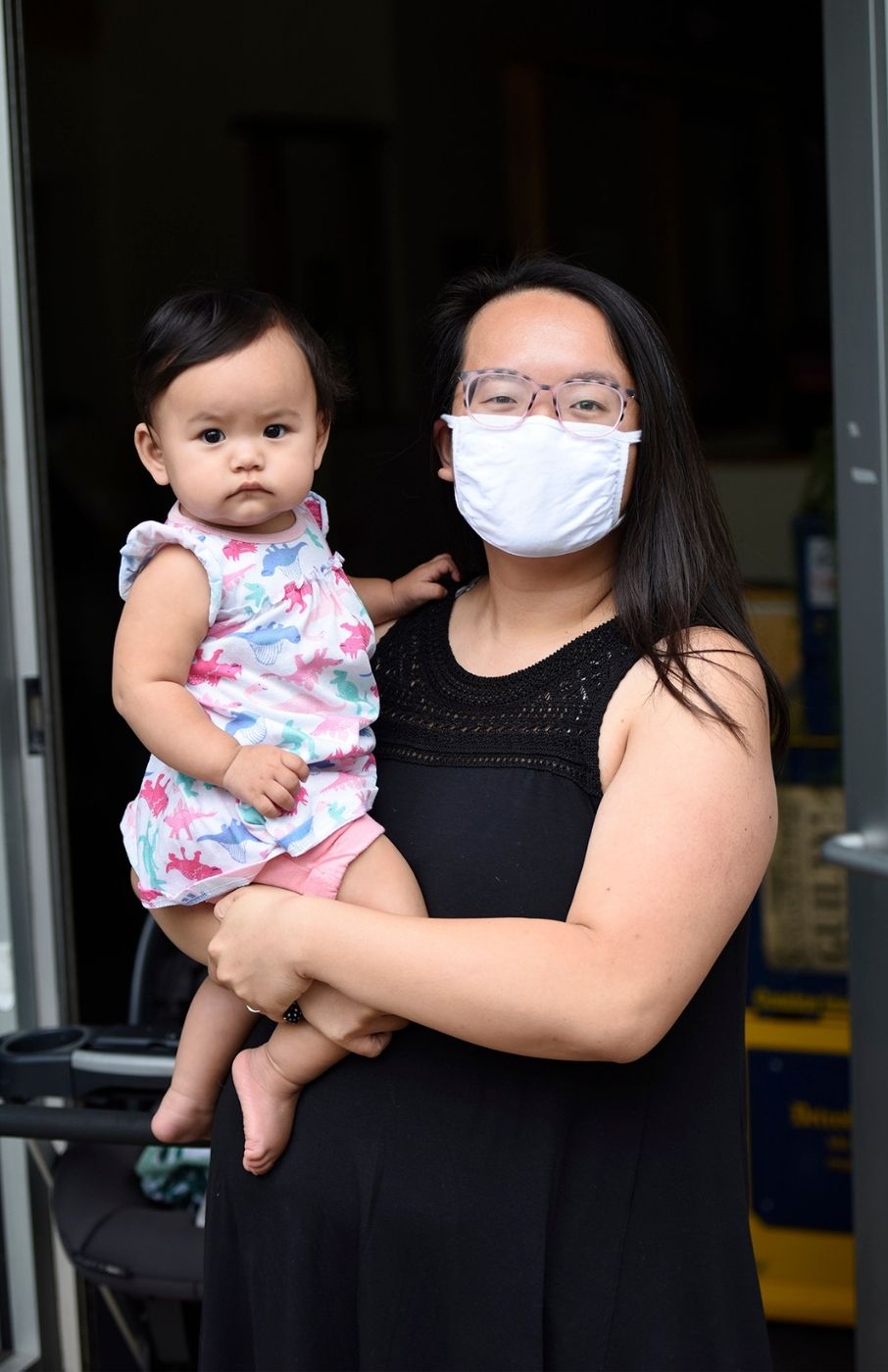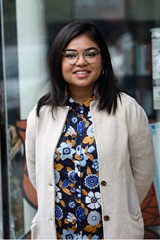If We Build the Movement
Lily Huang
Co-Executive Director
Massachusetts Jobs with Justice
Tell us about your background and how you found yourself in Boston and organizing for workers’ rights.
I was born in Boston and lived here for two years with my grandmother. My parents and my aunties and uncles were all in the same building in Chinatown. And then my mom struck out for Quincy and bought a house, so we moved there with my brother and father when I was two. Chinatown had become less affordable and it’s even more so now.
Your zeal for your work emerged from having working parents. Tell me a little more about that.
My family was the first generation to come to the U.S. My grandma took care of my two cousins, my brother, and me—all under four years old—in her studio apartment in Chinatown. She couldn’t write in Chinese or English, but she was the sweetest and strongest person I know. My dad worked for decades as a Chinese restaurant worker and my mom balanced three jobs, working as an English teacher, a receptionist at a bank, and also as a realtor. My other family members were hotel workers and Chinese grocery workers. Having my family work all day every day in low-wage jobs that are now considered essential jobs helped me see, from a young age, how working people really dedicate their lives to their jobs. They
have to make difficult decisions about how to how to take care of their kids, and often sacrifice their own health.
That’s why you spent so much time with your grandmother.
Exactly. And I have a baby now and I don’t have that “village” to help me raise my family. As our communities change, as the pandemic keeps some in quarantine and others working in riskier conditions, as jobs demand more of us, our families change too.
Watching them, as I was growing up, not making a living wage and not being able to take sick time, really pushed me to advocate for all workers to have these rights.
My father in particular. After I graduated from college and had an office job, he lost his job at a restaurant and had no car and no house and no access to health care. It showed me that there really wasn’t a social safety net and that workers like him are always at the edge. For myself, as a young person, navigating the health care system and the disability system and the social security system really put a weight on me that I hope no other kids will have to face.
So even before college, did you know that you would want to dedicate your life to workers’ rights?
When I was growing up I was surrounded by people who were very much like me. In Quincy, there are a lot of Asian American and Chinese American kids whose dads also worked in a restaurant and whose moms were waitresses or bank workers or hotel workers or restaurant workers, so it felt very natural to me. It wasn’t until I went to college—and I could see firsthand the disparities and the discrepancies and the wealth gap—that I really understood what my parents had faced. And I also spent a lot of time when I was in college at the U.S.-Mexico border being with migrants in migrant shelters and young children in what they called shanty towns. That experience radicalized me and helped me understand what working class people face and connect the dots; even though my parents came and worked in Boston, many people face the same hurdles, like not being able to access benefits.
When you were doing the work at the border, was that part of your college education or something you did in between?
When I was in college, I studied geography and Spanish, and so I learned a lot about political issues, such as migration, boundaries, the history of colonization and U.S. imperialism… When I was looking into study abroad programs, the one that came up that really intrigued me was going to the U.S.-Mexico border. So, I studied in El Paso, Texas and Ciudad Juárez, Mexico with the Earlham College Border Studies Program. I returned to the borderlands twice for more courses and a fellowship.
How did you get into the world of nonprofits?
After college, I actually went to work for the Earlham College Border Studies Program and moved to Tucson for a year. That was when my father started getting sick and so I returned back to Boston. I worked at a nonprofit that was focused on public housing, while at the same time helping my dad. I found that I had a talent for organizing and I looked up “immigrant rights.” So I started reaching out and realized that there was a huge population of undocumented people who didn’t have access to in-state tuition. So, I started organizing. I started traveling around the state to Haverhill and Worcester to talk with students in high school classes and college classes. I organized and shared their stories. I called on then Senator Brown to pass the DREAM Act. I even slept outside the State House for two weeks—14 nights and 14 days.
I saw undocumented students say they weren’t afraid, and they organized and won. And at the same time, I saw my father not having the ability to advocate for himself at work when he got sick. That was a real lesson. We have to organize because we have to win. If we don’t even try to organize, then we, as a community and as workers, are going to get sick. We can’t put profits over people in that way.
What is your focus now and what is your hope as you look forward to the next decade in Boston and Massachusetts?
I think all of our questions have shifted with the pandemic and with the struggle for racial justice and the Black Lives Matter uprising. I think in Boston, we’re really faced with a growing movement for racial justice and economic justice. We know about the wealth gap here in Boston and we also know about the issues that Black and Brown students are facing in our schools and in their communities. And so, it’s up to organizations like Massachusetts Jobs with Justice that have had a strong coalition of community groups and unions and students, to advance working-class, multi-racial power in Massachusetts. It’s up to us, as individuals and families and community members, to stand in solidarity with workers who might be facing bad bosses or bad corporations, retaliation at work or even deportation. We know that if we stand together, we’ll win. So, now is the time to stand in solidarity with others so that we have a chance of making a better world for the future.
Because of the time we’re in now—with the Black Lives Matter movement and disparities in health rising to the surface—do you think it’s a unique opportunity to accomplish some social justice goals?
Yes, I think it’s an opening, right? The movement that we’re seeing involves workers standing up for their rights, such as the workers at Whole Foods. Our voices matter.
The time is now to take a stand, to organize, and to take on these profiteers, who are making money while causing pain in our communities. There is a statistic that shows that billionaires are making more during the pandemic than ever, while other workers are facing a lot of risk.
The statistic showed that American billionaires got $434 billion richer during the pandemic. [This is according to a study by the Institute for Policy Studies that looked at the time between March 18 and May 19 of this year. By June, CNN was reporting that it had grown to $565 billion.]
I’m intrigued about the way you speak so positively of results. You say, “If we stand together, then we know we can win.” What experiences have led you to have that kind of optimism?
I think the question is: What does winning look like? Winning is not always the legislation we want to pass or the campaign we want to win, though that is one of the obvious goals. But there is also building relationships with each other, empowering parents to speak up about access to education in schools for their kids or a worker’s right to safe and healthy working conditions. And so, I’ve seen so much growth and victories for the future. For instance, there was a woman who was afraid of deportation and she used to shake because she was so ashamed of being undocumented. It’s really through community organizing that we’re able to show that this is not her fault. This is an issue of the American immigration system that put her in a place where she couldn’t legalize her status. It was great to see her get back her voice in advocating for herself and others to stop deportations—and then speaking out for her children about their education and for her sister so that she would have access to a kidney transplant.
So, when I talk about winning, I mean that I see winning as being on so many different levels. It’s really relationship building for the future. I have a small ‘r’ tattoo on my wrist that a friend and I got. A big ‘R’ is for revolution, but the small ‘r’ is about the relationships we build with each other. That’s what’s really going to get us through these dark times.
Would you say that immigration reform is the most important issue you’re working on? Do you think the Safe Communities Act legislation might pass?
I’m disappointed in the way our legislators aren’t brave enough to protect immigrants in the community.
It’s up to us to take care of each other. That’s why we were called upon to start Massachusetts UndocuFund, which raised $1 million for undocumented immigrants—with a nonprofit of five people.
We saw that the Legislature wasn’t acting quickly enough and in the end, they did not pass the bill that would have given relief for undocumented people who pay taxes through the ITIN identification number. [An ITIN is a tax processing number issued by the IRS to people who do not have U.S. Social Security numbers, including undocumented immigrants.] It’s disappointing to see the lack of boldness from our legislators to act for immigrant rights.
And this is when you think about places like Framingham, where Brazilian immigrants—and later Central Americans—really revitalized downtown Framingham. In places like East Boston and Jamaica Plain, it’s really immigrants opening bodegas and hair salons and mom and pop shops that kept Boston going and revitalized it and made them places where people wanted to move to and live—and that, unfortunately, has made those places unaffordable for immigrants.
Do you work with unions? Is that a part of what you do?
Yes, we work closely with unions and community groups. If you look at the history of Jobs with Justice, which has national chapters across the country, it was one of the first organizations and coalitions that talked about intersectionality.
We work closely with worker centers to help build them and to show unions how worker centers could communicate with the communities that they’re based in and stand up for their rights. We make sure that—in places where we have both unions and community groups—all voices are heard and that the community group that has one staff person has the same weight as a union.
Do you see any specific legislation coming up that could help immigrants and workers?
I do think that if we advocate for lifting all boats, that working people will benefit. That means looking at progressive revenue, increasing taxes on profitable corporations and their stakeholders, and passing the Fair Share Amendment; this would create billions in revenue for our public schools and public transportation services. I think any legislation that starts with working people to build their collective voice and bargaining power at work will help them during this pandemic and during the recovery period. We advocate for things like the Fair Work Week, which has passed in other states and that would ensure that workers in hospitality, hotels, and restaurants have access to a predictable schedule and pay. Right now, schedules are often unpredictable and that’s hard on families and their kids, because they can’t take them to doctor’s appointments and they aren’t able to schedule their second job or their school time, whether that’s online or in person. One of the tools that can make workers’ lives more just and fair is to have a schedule and pay that is predictable.
I think it’s important that, as organizers and advocates, we don’t focus on legislation. We have to dream of the world we want to see and how to get there. And we have to build the movement, with people and the community organizing, talking to each other, and finding solutions with each other. If we build the movement, then policy will follow. With policy and no movement, you can’t get legislation passed. Policy follows the movement because we’ll already have active participants in our democracy, leaders in the workplace advocating for themselves and for each other, bargaining with their employer. Even if they don’t have a union, they would be able to bargain and our community members would support that with customer boycotts. If parents are speaking out about their kids at school, we’ll be able to say, You’re right. We should be providing PPE or we should have smaller class sizes so that kids are socially distancing or we should still have art classes, even though schools are struggling.
"Winning is not always the legislation we want to pass or the campaign we want to win [...]. But there is also building relationships with each other, empowering parents to speak up about access to education in schools for their kids or a worker’s right to safe and healthy working conditions."
If we have all of these people speaking up, talking to each other and thinking of solutions and campaigns with Massachusetts Jobs with Justice—that’s what we’re here for—then the policy will come. It will be won over, implemented, and enforced more easily. It will actually look like the policy that will affect workers’ everyday lives. It’s more life giving than lobbying.
When you think about yourself and the two young emerging leaders you’ve identified, what are the qualities you think are important for an effective leader?
I think an effective leader needs to be bold and courageous. Someone who can dream of new ideas and believe that it’s possible that when we come together we can find solutions together.
I think an effective leader needs to find other people to organize with and advocate with and give them opportunities to speak out or to share their story or share their resources. Maybe someone has a radio station or is really active in the arts, then the effective leader finds ways to utilize their skills and has created more leaders.
We need to go farther together. If anything, the pandemic has shown that we need to have a very deep bench of future leaders and organizers like the two people I’ve referred to you as emerging leaders, because we need each other.
I think your framing of this report is really great. People are looking for vision for the future and how we recover from all of this.




